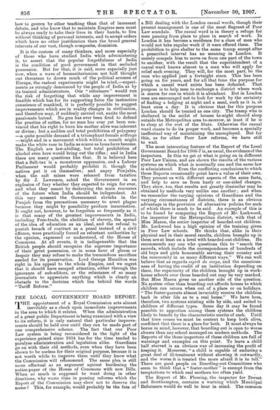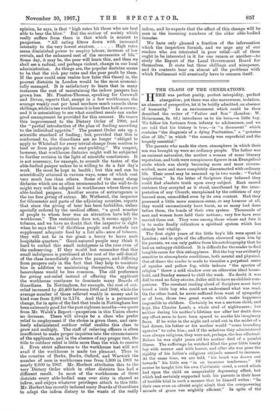THE LOCAL GOVERNMENT BOARD REPORT.
THE appointment of a Royal Commission acts almost inevitably as a check upon immediate improvements in the area to which it relates. When the administration of a great public Department is being examined with a view to its reform, it is only natural that particular improve- ments should be held over until they can be made part of one comprehensive scheme. The fact that our Poor Law system is being reconsidered in the light of the experience gained since 1834 has for the time tended to paralyse administration and legislation alike. Guardians go on with their old methods, even when they have been shown to be useless for their original purpose, because it is not worth while to im,prove them until they know what the Commission will relommend. The same plea is still more effectual as an argument against burdening the notice-paper of the House of Commons with new Bills. When so much is supposed to want doing in other directions, why waste time in passing reforms which the Report of the Commission may show not to deserve the name ? This, for example, would probably be the fate of a Bill dealing with the London casual wards, though their present management is one of the most flagrant of Poor Law scandals. The casual ward is in theory a refuge for men passing from place to place in search of work. In London it has become a residence for a class of men who would not take regular work if it were offered them. The prohibition to give shelter to the same tramp except after a prescribed interval has no meaning in London. It merely compels him to move on from one part of the town to another, with the result that the superintendent of a casual ward knows almost to a man who will apply for relief each evening. They will, for the most part, be the men who applied just a fortnight since. This has been going on for years, and for all that time the purpose for which a casual ward exists has been defeated. That purpose is to help men to exchange a district where work is scarce for one in which it is abundant. But in London men are encouraged not to look for work by the certainty of finding a lodging at night and a meal, such as it is, at least once a day. It is obvious that for this purpose London should be treated as one city. The tramp who is sheltered in the midst of houses to-night should sleep outside the Metropolitan area to-morrow, at least if he is to sleep at the cost of the State. Otherwise the casual ward ceases to do its proper work, and becomes a specially ineffectual way of maintaining the unemployed. But for this, as for other Poor Law reforms, we have still to wait.
The most interesting feature of the Report of the Local Government Board for 1906-7 is, as usual, the evidence of the inspectors. In this we get at what is going on in different Poor Law Unions, and are shown the results of the various systems on which what is nominally one and the same law is administered. Even the conflicting conclusions to which these Reports occasionally point have a value of their own. They present us with different aspects of the same facts, and help to save us from hasty or one-sided changes. They show, too, that results not greatly dissimilar may be obtained by methods very unlike one another ; and when we remember the varying opinions of Guardians and the varying circumstances of districts, there is an obvious advantage in the provision of alternative policies for each of which there is much to be said. An example of this is to be found by comparing the Report of Mr. Lockwood, the inspector for the Metropolitan district, with that of Miss Mason, the senior inspector of boarded-out children. Mr. Lockwood has a high opinion of the training given in Poor Law schools. He thinks that, alike in their physical and in their moral results, children brought up in them are at least on a level with boarded-out children. He recommends any one who questions this to " search the records, which include the correspondence of hundreds of old boys and girls honourably serving their country and the community in as many different ways." We can well believe that as regards esprit de corps, and the conscious- ness of having the credit of an institution depending on them, the superiority of the children brought up in work- house schools over those boarded out may be very marked. But Miss Mason gives us another side of the question. No system other than boarding out affords homes to which children can return when out of a place or on holidays. " The foster-parents almost invariably receive the children back in after life as to a real home." We have here, therefore, two systems existing side by side, and suited to children of different types. Some day it may be found possible to apportion among these systems the children likely to benefit by the characteristic merits of each. Until that time comes we must be content to keep both alive, confident that there is a place for both. It must always be borne in mind, however, that boarding out is open to worse abuses than any school managed on modern methods. The Reports of the three inspectors of these children are full of warnings and examples on this point. To leave a child half starved is an obvious way of increasing the profit of keeping it. Moreover, " a child is capable of enduring a great deal of ill-treatment without showing it outwardly, and the worse it is treated the more afraid it is to tell."' There are good people on Boarding-out Committees who seem to think that a " foster-mother" is exempt from the temptations to which real mothers too often yield. , The Report of Mr. Fleming, the inspector for Dorset and Southampton, contains a warning which Municipal- Reformers would do well to bear in mind. The common opinion, he says, is that " high rates hit those who are best able to bear the blow." But the section of society which really suffers from them is that which is nearest to pauperism. " All rating filters down with increased intensity to the very lowest stratum High rates mean diminished power to employ labour, increase of low rentals, and the enhanced cost of the necessaries of life." Some day, it may be, the poor will learn this, and then we shall see a radical, and perhaps violent, change in our local administration. As things are, the popular doctrine seems to be that the rich pay rates and the poor profit by them. If the poor could once realise how false this theory is, the poorest districts in London would be the most economi- cally managed. It is satisfactory to learn that in many instances the cost of maintaining the indoor paupers has grown less. Mr. Preston-Thomas, speaking for Cornwall and Devon, reports that, except in a few workhouses, the average weekly cost per head nowhere much exceeds three shillings, while in ten workhouses it is less than half-a-crown ; and it is astonishing to see what excellent meals can under good management be provided for this amount. He traces this improvement to the Dietary Order of 1900, and the " partial introduction of the plan of feeding according to the individual appetite." The present Order sets up a scientific standard of feeding; but, provided that this is conformed to, the Guardians are no longer " obliged to apply to Whitehall for every trivial change from mutton to beef or from potato-pie to suet-pudding." We suspect, however, that workhouse dietaries might well be subjected to further revision in the light of scientific conclusions. It is not necessary, for example, to consult the tastes of the able-bodied pauper unless he is willing to do a fair day's work. He must Fie kept in health ; but this end can be scientifically attained in various ways, some of which cost very much less than others. Some of the many cheap dietaries which are so often recommended to the well-to-do might very well be adopted in workhouses where there are able-bodied paupers. Another source of extravagance is the too free giving of extras. Mr. Wethered, the inspector for Gloucester and parts of the adjoining counties, reports that since the giving of beer has been forbidden, unless specially ordered by the medical officer, " a good number of people to whom beer was an attraction have left the workhouse." The restriction does not, it seems, apply to tobacco, and we have no doubt that the inspector is right when he says that "if thriftless people and wastrels can supplement adequate food by a, fair alio ance of tobacco, they will not be in too great a hurry to leave such hospitable quarters." Good-natured people may think it bard to curtail this small indulgence in the case even of the undeserving. If they would but remember that this small indulgence is purchased at the cost of the self-denial of the class immediately above the paupers, and differing from paupers only in the fact that they help to maintain him in addition to maintaining themselves, this cheap benevolence would be less common. The old preference for giving out-relief instead of offering the applicant the workhouse continues to dominate many Boards of Guardians. In Nottingham, for example, the cost of out- relief increased by £6,460 between 1901 and 1906, while the average number of those relieved weekly in money and in kind rose from 2,881 to 3,174. And this is a permanent change, for in spite of the fact that trade in Nottingham has been extremely good for the past eighteen months—we quote from Mr. Walsh's Report—pauperism in this Union shows no decrease. There will always be a class who prefer relief to employment if the choice is given them, and care- lessly administered outdoor relief enables this class to grow and multiply. The staff of relieving officers is often insufficient to make proper inquiries into the circumstances of the applicants, and in the absence of any proper test, the title to outdoor relief is little more than the wish to receive it. Even strict adherence to the workhouse test will not avail if the workhouse is made too pleasant. Thus in the counties of Berks, Bucks, Oxford, and Warwick the number of men in workhouses rose from 5,800 in 1901 to nearly 8,000 in 1907. Mr. Herbert attributes this to the very Dietary Order which in other districts has had a different result. In most of the workhouses of these districts every able-bodied man over sixty is classed as infirm, and enjoys whatever privileges attach to this title. Mr. Herbert has recently induced many Boards of Guardians to adapt the infirm dietary to the wants of the really infirm, and he expects that the effect of this change will be seen in the lessening numbers of the older able-bodied inmates.
We have only gleaned a fraction of the information which the inspectors furnish, and we urge any of our readers who are interested in poor relief—all of them ought to be interested in it for one reason or another—to study the Report of the Local Government Board for themselves. It costs but three shillings and ninepence, and its contents bear on almost all the problems with which Parliament will eventually have to concern itself.



















































 Previous page
Previous page